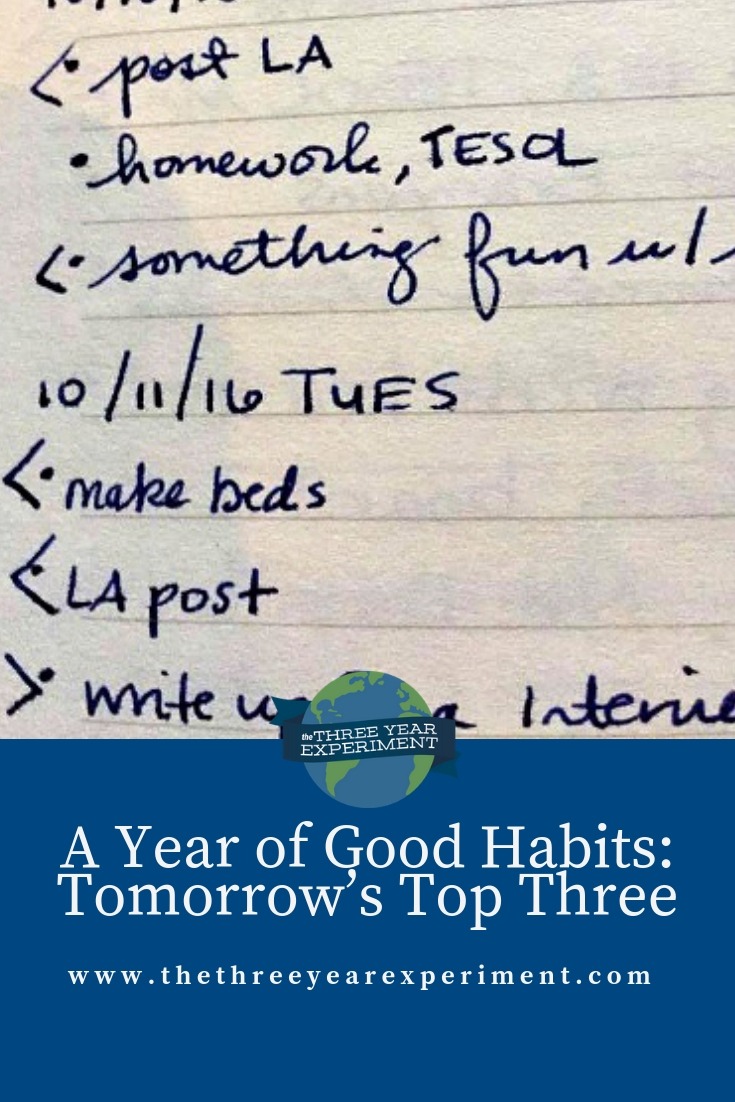I’m going to spend each month of this year focused on building one new good habit to help our family achieve our goal of location independence, doubling our net worth, and moving abroad in three short years. This month, I’ll be focused on setting tomorrow’s top three goals.
Habits are the building blocks of our daily life, and I believe that focusing on replacing any bad or even “meh” financial and daily habits with good ones will put our goals into hyper-drive.
January
In January, our habit was budgeting correctly. Our family has used a budget to manage our daily finances since 2008. However, we always went over our spending in certain categories, and ended up with big deficits in our spending categories which we would make up with windfall or bonus money. We weren’t budgeting realistically, and it was bringing us a lot of frustration (plus all that “extra” money couldn’t be put to work in investing). So we signed up for YNAB (You Need a Budget) and have been making a habit to accurately budget our money ever since. We believe that tracking your spending is one of the best ways to change your spending habits, and accurately budgeting has made us feel more successful and in control of our finances.
February
In February, my habit was making our bed every day. Even though this isn’t strictly a “financial” habit, making your bed has myriad implications for making yourself feel immediately successful at your day. Our winters are so long, grey, and full of sickness, that I kept the bar “low” this month, and focused on something relatively easy that would make me feel accomplished all day long.
March
This month, I needed to pick a habit that will help me focus. That is, with all the cacophony in the world today, I find it increasingly easy to become distracted, to not even remember what my goals are, much less achieve them. So this month’s habit will be setting Tomorrow’s Top Three.
Every day, I’ll work to determine my top three goals for the following day and set them early, before lunch. I’ll also write the time I’d like to accomplish them by in my bullet journal.

Channel Capacity
This habit takes channel capacity into account, by helping me focus on getting the most important things done each day. I can only pick the three most important things, so it forces me to prioritize my plans.
I use a bullet journal, like Tsh from The Art of Simple and Kendra from the Lazy Genius. The bullet journal system helps you organize your monthly and daily goals.
I also create a one-page sheet of yearly goals at the beginning of the year. This page lists my goals and also breaks them down into quarterly goals, so I can keep track of what I need to do each quarter to achieve my yearly plans. I’ll need to review those each day, as I set my daily goals, to make sure I’m on track.

Time to Cue Up
As I think about the Cue, Routine, and Reward cycle, I know I have to find a cue for daily goal writing. Last month, my cue for making the bed was Mr. ThreeYear leaving for work. Seeing him leave would remind me that I was supposed to go and make the bed (I’ll post an update on how I did with that, and the other First Quarter Goals at the end of the month). For this month, I need a daily time to set goal, so I’m going to try just before lunchtime. I’ll need to have my bullet journal handy to give myself a visual cue, so it will need to come with me to work. Seeing the days of “top three goals” in my journal will hopefully remind me and incentivize my brain to keep setting goals each day.
Now I need an incentive to keep writing and pursuing goals, a reward. It should be something that gives my brain an endorphin rush, so that tomorrow, it will be motivated to stick with the new behavior. I definitely love to achieve goals, so I’ll see if crossing off the To-Do items in my bullet journal will hopefully be enough of a reward to keep me goin.
Why is it a good idea to set only three goals per day?
I got the idea for this goal from the book Organize Tomorrow Today: 8 Ways to Retrain Your Mind by Dr. Jason Self and Tom Bartow. The two authors have spent years working with professional athletes on performance improvement techniques and in this book.
The radical technique in this book, one that I absolutely loved, was that the authors insisted you adopt ONE habit at a time to focus on. The authors note: “Channel capacity is the key. One of the biggest mistakes people make in business and in life is that they try to change too many things too quickly.” They advise that instead, you should pick one of their eight performance improvement ideas and when you’ve successfully implemented it 90% of the time over 3 months, then you’re ready to add another tip. As they note, “the key to high-level success is to pick one thing to change—yes, just one—and master it.”
Give Your Mind a Break!
The same idea of channel capacity is at play in picking three, and only three, goals for the day. The mind can remember about seven things at a time, give or take two, so by writing down three goals, I’m giving myself a good chance that I’ll be able to remember my top three. It also focuses me to pare down my to-do list to the most essential things.
So, when I pick my Top Three for tomorrow, I’ll need to decide what is the most important for me to get done to have the best chance to reach my quarterly and yearly goals. Sometimes that doesn’t happen, though. For today, I’ve set three goals to
- run by 8am
- write an invoice by 11am
- fill out my son’s paperwork for the doctor by 5pm
Writing an invoice definitely helps me achieve my financial goals, but running? Well, that’s my mental health. And that pesky paperwork has been looming for weeks, so if I get it accomplished, I’ll be proud of myself, which will create a virtuous cycle of me wanting to do other things to feel proud. I’m a big believer in the idea of becoming a person who does what she says she will do, like this article explains in depth. If I set three goals and accomplish them, day in and day out during March, then I’m reminding myself I’m a person who sets goals and achieves them, even if they’re small goals. Then I start to trust myself more and more.
Why do I need to set my goals the night before?
Apparently, our brains work on problems all night long, and they prefer a closed-loop. That is, if I’ve already set my top three, my brain will then work on those problems for me, figuring out ways I can accomplish those goals, by coming up with solutions or rehearsing me meeting the goal while I sleep. If I didn’t set my goals, my brain might explore the several thousand possibilities available for goals for the following day, or dream about the last thing I read before I went to sleep.

I definitely want my brain working for, and not against, my to-do list, so setting goals the night before is important. The Organize Tomorrow Today authors make an excellent point that if we wait until the night before to set goals, most of us are at our most tired points of the day. We’re not thinking fresh and clearly, like we are in the morning (I know this isn’t true for some people, but it definitely is for me. By about 4pm, I am mentally done!). If I set my goals before lunch, then I’ll probably have a good chance to picking thoughtful goals that will better help me, and therefore our family, achieve our goals of doubling our net worth and location independence in the next three years.
Why should I set a time to achieve the goal?
I think this goes back to visualization. If I’ve written a time to achieve the goal, it’s more specific and I’m more likely to visualize myself working on the task during the day. If I write “Run,” then that could be anytime of day or evening, but if I write “run by 8am,” I know it has to happen before the kids leave for school, which means I’ve got to make plans with my running partners at 6:30am or run on the treadmill. I’m sifting through the much more limited possibilities in my mind, and seeing myself texting my friends, getting up at 6:30am, and meeting them for a run.
When I decide to fill out paperwork for the doctor, I have to think through when that will happen. Since my son is integral to this task (i.e., he has to fill out a questionnaire on his own), I have to schedule that task for before or after school. Since before school is usually busy with precious few minutes for extra tasks, I need to make this a task for after school, and have it ready for my son when he walks in the door from the bus.
While I’ve attempted this goal in the past, I’ve never been very consistent, so I am going to work very hard to set my goals every day for the next thirty days. I’ll post an update for this and my January and February goals at the end of the month.




I love your bedroom! Good luck with defining your goals 😉
Thanks, Lena! Our bedroom is definitely my happy place. Goals written for today and tomorrow, so I’m 2 for 31 at least! 🙂